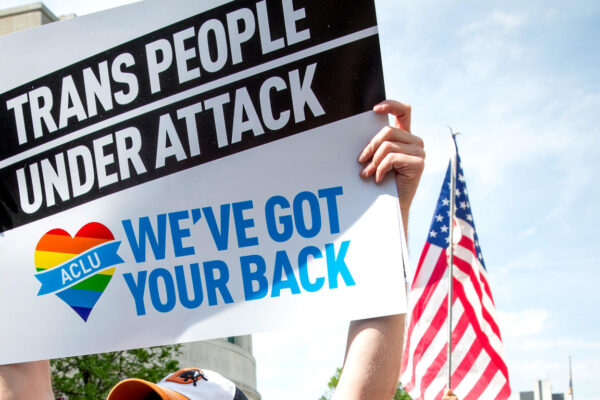By James Esseks, Director, LGBT & HIV Project
Over the past year, as public policy debates about transgender rights have deepened — and anti-trans rhetoric has escalated — in state legislatures and in the courts, our nation has started learning more about who transgender people are — our neighbors, our co-workers, our fellow students, and our family members.
The national discussion often focuses on what restroom transgender people should use, even though the range of issues affecting the community is much broader. When it comes to single-sex spaces and activities, the ACLU has a clear position: Transgender people can use facilities and participate in activities that match who they are. We believe it is not only the right answer from a human point of view, but it is also legally required by statutory and constitutional bans on sex discrimination.
We have taken that position while fighting anti-transgender bills in at least 17 states this past year as well as in court, where we represent transgender people in all three of the current cases challenging bans on transgender individuals’ use of restrooms consistent with their gender identity (in Virginia, North Carolina, and Illinois). The ACLU’s position derives from our core commitment to equality and reflects our decades-long work to fight sex discrimination, including on behalf of women, transgender people, and lesbian, gay, and bisexual people.
Everyone has to use the restroom. Transgender people live their lives consistent with their gender identity (the internal sense we all have of our gender). When transgender individuals are barred from using restrooms that match who they are, they are essentially closed off from participating in public life. A transgender woman is a woman. To tell her (as to tell any woman) that she must use the men’s room undermines her identity. In addition, it subjects her to a real risk of violence.
Similarly, a transgender man is a man. To tell him (as to tell any man) that he must use the women’s room undermines his identity and subjects him to a risk of violence and harassment. In addition, for many transgender people, living their gender in all parts of their lives, including when using single-sex spaces, is part of the medical treatment that is prescribed for them — it alleviates what would otherwise be significant distress.
It’s no accident that this issue is surfacing now, as protections for transgender people increasingly become part of the national conversation. Restrooms have been center stage in prior civil rights fights, including for African-Americans, for men and women around the Equal Rights Amendment, in the context of fighting for access for people living with disabilities, and during the peak of the AIDS crisis, when homophobia fed fears of gay people using restrooms. Opponents of transgender equality are seeking to exploit the public’s lack of knowledge about transgender people to incite fear and stop any further progress for transgender rights or more broadly for LGBT rights.
We’re in the midst of a major civil rights battle, one that’s likely to continue for some time. Thankfully, the Department of Justice and the Department of Education are fighting for equality with us.
The ACLU’s work on behalf of transgender people, including educating the public about who trans people are through our communications and advocacy work, is far from over.




